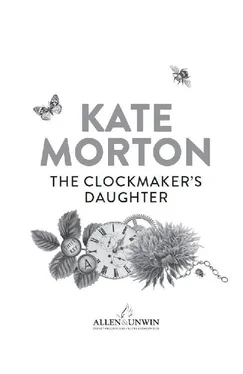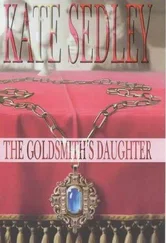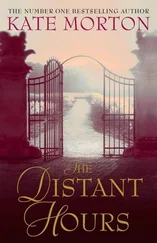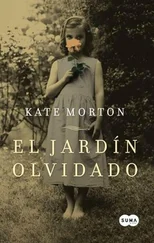Kate Morton - The Clockmaker's Daughter
Здесь есть возможность читать онлайн «Kate Morton - The Clockmaker's Daughter» весь текст электронной книги совершенно бесплатно (целиком полную версию без сокращений). В некоторых случаях можно слушать аудио, скачать через торрент в формате fb2 и присутствует краткое содержание. Год выпуска: 2018, Издательство: Allen & Unwin, Жанр: Старинная литература, на английском языке. Описание произведения, (предисловие) а так же отзывы посетителей доступны на портале библиотеки ЛибКат.
- Название:The Clockmaker's Daughter
- Автор:
- Издательство:Allen & Unwin
- Жанр:
- Год:2018
- ISBN:нет данных
- Рейтинг книги:4 / 5. Голосов: 1
-
Избранное:Добавить в избранное
- Отзывы:
-
Ваша оценка:
- 80
- 1
- 2
- 3
- 4
- 5
The Clockmaker's Daughter: краткое содержание, описание и аннотация
Предлагаем к чтению аннотацию, описание, краткое содержание или предисловие (зависит от того, что написал сам автор книги «The Clockmaker's Daughter»). Если вы не нашли необходимую информацию о книге — напишите в комментариях, мы постараемся отыскать её.
The Clockmaker's Daughter — читать онлайн бесплатно полную книгу (весь текст) целиком
Ниже представлен текст книги, разбитый по страницам. Система сохранения места последней прочитанной страницы, позволяет с удобством читать онлайн бесплатно книгу «The Clockmaker's Daughter», без необходимости каждый раз заново искать на чём Вы остановились. Поставьте закладку, и сможете в любой момент перейти на страницу, на которой закончили чтение.
Интервал:
Закладка:
The bus arrived at South End Green and Elodie stopped briefly to make a purchase at the stall by the Overground station before hurrying up Willow Road towards Gainsborough Gardens. The day was still warm and very stuffy, and by the time she arrived at the door of her father’s tiny house – originally the gardener’s cottage – Elodie felt as if she’d run a marathon.
‘Hello, Dad,’ she said, as he gave her a kiss. ‘I’ve brought you something.’
‘Oh, dear,’ he said, eyeing the potted plant dubiously. ‘Even after how things ended last time?’
‘I believe in you. Besides, the lady selling them told me this one only needs watering twice a year.’
‘Good God, really? Twice a year?’
‘That’s what she said.’
‘Miraculous.’
Despite the heat, he’d prepared duck à l’orange , his speciality, and they ate together at the table in the kitchen as they always did. They’d never really been a dining-room family, only on special occasions, like Christmas or birthdays, or the time Elodie’s mother had decided they should invite the visiting American violinist and his wife for Thanksgiving.
As they ate they spoke of work: Elodie’s curation of the upcoming exhibition and her father’s choir, the music lessons he’d been giving recently at one of the local primary schools. His face lit up when he described the little girl whose violin was almost as long as her arm, and the bright-eyed boy who’d come to the practice room of his own accord and begged for cello lessons. ‘His parents aren’t musical, you see.’
‘Let me guess: the two of you came to your own arrangement?’
‘I hadn’t the heart to say no.’
Elodie smiled. Her father was a soft touch when it came to music and wouldn’t have dreamed of denying a child the opportunity to share his great love. He believed that music had the power to alter people’s lives – ‘their very minds, Elodie’ – and nothing made him quite as excited as discussing brain plasticity and MRI scans showing a connection between music and empathy. It made Elodie’s heart clench to watch him watching a concert: the utter transfixion of his face beside her in the theatre. He had been a professional musician once himself. ‘Only second violinist,’ he always qualified when the subject arose, a trace of reverence entering his voice as he continued predictably: ‘Nothing like she was.’
She . Elodie’s gaze drifted to the dining room on the other side of the hall. From where she was sitting only the edges of a few frames were visible, but Elodie didn’t need to look upon the wall to know exactly which picture was hanging where. Their positions never altered. It was her mother’s wall. That is, it was Lauren Adler’s wall; striking black-and-white photographs of a vibrant young woman with long, straight hair and a cello in her embrace.
Elodie had made a study of the photographs when she was a child and they were thus printed indelibly on her mind’s eye. Her mother, in various attitudes of performance, concentration fine-tuning her features: those high cheekbones; the focused gaze; her clever articulated fingers on strings that gleamed beneath the lights.
‘Fancy a bit of pudding?’
Her father had taken a quivering strawberry concoction from the refrigerator, and Elodie noticed suddenly how old he was compared with the images of her mother, whose youth and beauty were locked in the amber of her memory.
Because the weather was glorious, they took their wine glasses and dessert upstairs to the rooftop terrace that overlooked the green. A trio of brothers were tossing a frisbee, the smallest one running back and forth across the grass between the others, while a pair of adults sat together nearby, their heads bent close in conversation.
The summer twilight cast a soporific glow, and Elodie was reluctant to spoil things. Nonetheless, after a few minutes of the easy companionable silence in which she and her father had always specialised, she ventured, ‘Do you know what I was thinking of today?’
‘What’s that?’ He had a spot of cream on his chin.
‘That bedtime story from when I was little – the one about the river, and the house with the moon-and-stars weathervane. Do you remember it?’
He laughed with soft surprise. ‘Goodness! That’s taken me back. Yes, of course, you used to love that one. It’s been a long time since I’ve thought of it. I always wondered that it might not be a bit too scary for a child, but your mother believed that children were much braver than they were given credit for. She said that childhood was a frightening time and that hearing scary stories was a way of feeling less alone. It seemed that you agreed: whenever she was away on tour you were never happy with the books I read. I used to feel quite rejected. You’d hide them under your bed so I couldn’t find them and demand that I tell you instead about the clearing in the deep, dark woods and the magic house on the river.’
Elodie smiled.
‘You were not pleased with my attempts. Feet were stomped, words like “No!” and “Not like that!” bandied about.’
‘Oh, dear.’
‘It wasn’t your fault. Your mother was a wonderful storyteller.’
Her father fell into a melancholy silence, but Elodie, who was usually mindful not to trespass on her father’s old grief, pressed on gingerly. ‘I wonder, Dad – is it possible that the story actually came from a book?’
‘Would that it had. I’d have been saved a lot of time trying to console my inconsolable child. No, it was an invention, a family story. I remember your mother saying it had been passed down to her when she was young.’
‘I thought so too, but perhaps she got it wrong? Maybe whoever told her the story had read it in a book? One of those illustrated Victorian books for children.’
‘It’s possible, I suppose.’ He frowned. ‘But what’s all this about?’
With a prickle of sudden nerves, Elodie withdrew the sketchbook from her bag and handed it to her father, open to the drawing of the house. ‘I found this at work today, in a box.’
‘It’s lovely … and obviously drawn by a fine artist … wonderful penmanship …’ He looked at it a little longer before glancing at Elodie uncertainly.
‘Dad, can’t you see? It’s the house from the story. An illustration of the very same house.’
He returned his attention to the sketch. ‘Well, it’s a house. And I see there’s a river.’
‘And woods, and a weathervane with a sun and moon.’
‘Yes, but … lovey, I dare say there are dozens of houses fitting that description.’
‘So precisely? Come on, Dad. This is the same house. The details are identical. More than that, the artist has captured the same feel as the house in the story. You must be able to see it?’ The possessive instinct came upon her suddenly and Elodie took the book back from her father. She couldn’t explain more emphatically than she already had: she didn’t know how, or what it meant, or why the sketch had turned up in the archives at work, but she knew it was the house from her mother’s story.
‘I’m sorry, love.’
‘Nothing to be sorry for.’ Even as she said it, Elodie felt the sting of impending tears. Ridiculous! To cry like a child over the provenance of a bedtime story. She grasped for a different subject, something – anything – to move the conversation on. ‘Have you heard from Tip?’
‘Not yet. But you know what he’s like. He doesn’t believe in the telephone.’
‘I’ll go and see him at the weekend.’
Silence fell once more between them, but this time it was neither easy nor companionable. Elodie watched the warm light at play on the leaves of the trees. She didn’t know why she felt so agitated. Even if it were the same house, what did it matter? Either the artist had made sketches for a book that her mother had read, or it was a real-life house that someone had seen and enfolded into the story. She knew she ought to let it go, to think of something pleasant and benign to say—
Читать дальшеИнтервал:
Закладка:
Похожие книги на «The Clockmaker's Daughter»
Представляем Вашему вниманию похожие книги на «The Clockmaker's Daughter» списком для выбора. Мы отобрали схожую по названию и смыслу литературу в надежде предоставить читателям больше вариантов отыскать новые, интересные, ещё непрочитанные произведения.
Обсуждение, отзывы о книге «The Clockmaker's Daughter» и просто собственные мнения читателей. Оставьте ваши комментарии, напишите, что Вы думаете о произведении, его смысле или главных героях. Укажите что конкретно понравилось, а что нет, и почему Вы так считаете.












